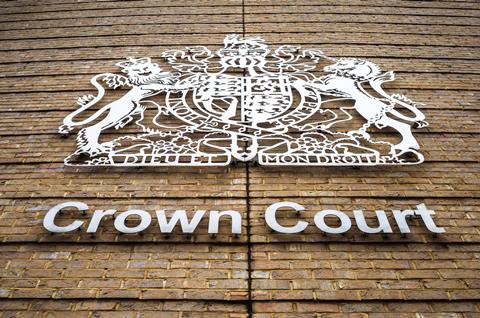Crown courts are in crisis, reports Catherine Baksi. The backlog continues to climb, the estate is crumbling and there aren’t enough lawyers. So what’s the plan?

Alarming figures published by the Ministry of Justice on 13 June revealed that the backlog of cases waiting to be heard in the Crown courts reached a record high of 68,125 at the end of April.
The figure is up by almost 8,000 from 60,760 in April last year. As spending watchdog the National Audit Office (NAO) said in a May report, the outgoing government’s stated ‘ambition’ to reduce the outstanding caseload to 53,000 by March 2025 is ‘no longer achievable’.
Based on the average monthly rise in the number of outstanding cases from January to April 2024, the Criminal Bar Association (CBA) estimates that the backlog could hit 72,000 this month – the figure that ministers had stated was their worst-case scenario.
Trial dates for summer 2026 are now commonplace, and the CBA predicts that 2027 trial dates are only a few months away from being set. As new cases continue to come into the system, without a sudden increase in the number of criminal barristers, the backlog looks set to grow further.
Victims, witnesses and defendants are all waiting longer. The average time taken from offence to case completion in the Crown court has increased from 486 days in the last quarter of 2019 to 683 days for the three months to December 2023.
Since the NAO’s 2021 report, the number of cases waiting for a year or more from initial listing has risen from 11,350 on 30 June 2021 (19% of the outstanding caseload) to 18,045 on 31 December 2023 (27% of the outstanding caseload).
As Law Society president Nick Emmerson puts it: ‘Decades of underfunding and cuts have left us with a justice system which is failing victims and defendants.’
Risk of failure
As waiting times increase, the risk that trials fail increases. This is because victims and witnesses may withdraw from proceedings. Moreover, their recollection of evidence declines. The wait also has a negative impact on their mental health.
The court backlog also contributes to the acute pressure on the prison population. In 2023 the number of people in custody on remand, awaiting a trial or sentencing, rose to its highest level for at least 50 years.
At the end of 2023, 16,005 people were remanded in prison awaiting trial or sentencing – 65% higher than in December 2019. Around two-thirds of those were awaiting trial and one-third to be sentenced.
Because some of those on remand will be found not guilty at trial, or receive a non-custodial sentence, trial delays for remand prisoners have the effect of disproportionately increasing the prison population.
Not just Covid and strikes
The government has blamed the impact of the pandemic, coupled with the effect of the barristers’ strike. But court backlogs were rising before Covid. And the CBA argues that without the fee rise agreed as a result of the action there would be even fewer barristers.
The situation is dire, Emmerson adds: ‘The courtrooms themselves are crumbling… There aren’t enough judges and lawyers to cover the cases. Pay and conditions to work in the system are unattractive and court staff are undermanned and under pressure.’
The NAO’s May report noted that the number of criminal law barristers and duty solicitors has been falling since at least 2017/18. Criminal law barristers doing publicly funded criminal work decreased by 10% between 2016/17 and 2021/22, while the number of criminal law duty solicitors contracted by the government to provide criminal legal aid fell by 25% between 2017 and 2023.
This shortage has a knock-on effect on trials. In 2023, 1,436 or 5% of trials were cancelled because of the unavailability of counsel – up from 71 (0.3%) in 2019. Overall, the proportion of ineffective trials has risen from 16% in 2019 to 27% in 2023. Almost 8,000 – a quarter of all trials – did not go ahead last year.
In addition to a dearth of barristers, the main reasons for this were witnesses and defendants not attending – often because prisoners had not been brought from jails – poor case preparation, over-listing of cases and the substandard physical state of the courts.
Postcode lottery
Stuart Nolan, chair of the Law Society’s criminal law committee and managing director at DBT & Partners in Liverpool, reports that the position differs across the country. In his local Crown courts in Merseyside, there are sufficient barristers and no backlog, and the Crown court is taking cases from other areas to help relieve the pressure. But, he says, colleagues in southern England report a ‘parlous’ situation. He identifies Kent, Birmingham and London as worst affected.

‘The entire system is creaking at the seams and almost at a state of collapse, and the overall backlog is getting worse, not better,’ he says.
Nolan is a solicitor-advocate, but says that it is not a practical or possible option for many solicitors to help alleviate the pressure in the Crown court. Due to the difficulty of recruiting junior solicitors to do criminal legal aid work – because of the poor rates of pay – most experienced solicitors have to cover work in the magistrates’ courts, where the backlog of cases is 387,042.
'The entire system is creaking at the seams and almost at a state of collapse, and the overall backlog is getting worse, not better'
Stuart Nolan, DBT & Partners
The shortage of barristers means that solicitors have to ring numerous chambers to find an advocate to cover cases – and as barristers are not paid for travelling if they go off-circuit, this is harder in some areas of the country than others.
Katy Hanson, vice-chair of the Criminal Law Solicitors’ Association and managing director of Welch & Co in Wales, recently called 19 chambers without success in one case. The Crown Prosecution Service did not have a barrister either and the trial had to be adjourned for six months.
For solicitors, the delay to cases has a serious impact on their income. ‘We are like rat catchers – we only get paid when we present the tail,’ says Nolan. In most cases, solicitors are not paid until the conclusion of the case. ‘It is bad for business and bad for our cashflow – the Inland Revenue, VAT and wages don’t wait,’ he adds.

Call to restore unanimous jury decisions
The Crown court’s jury system is regarded by many as the hallmark of fairness in criminal justice. A review by David Lammy, former shadow justice secretary, found that it was the single stage in the process where black or other ethnic minority defendants do not suffer adverse outcomes due to discrimination.
However, research for the charity Appeal appears to expose the hidden racist and classist prejudices behind the 1967 shift from unanimous to majority verdicts in England and Wales. Appeal has used the research’s findings to make the case for reform.
The study, led by Nisha Waller and Naima Sakande, delved into Home Office files, uncovering evidence that challenges the widely accepted narrative that majority verdicts were introduced to prevent ‘nobbling’ and the corruption of jurors through bribes or intimidation.
They examined archival documents that demonstrate that the change coincided with public anxieties about ‘coloured’ immigration, the rise of Black Power and anti-racist activism.
The report, Majority Jury Verdicts in England and Wales: A Vestige of White Supremacy? found that majority verdicts were – at least in part – introduced to dilute the influence of ‘coloured’ migrants and the new ‘labouring class’.
It found that the quid pro quo for allowing a wider jury pool that included black, brown and working-class people was to change the rules to ignore the votes of two members of the jury.
Appeal also identified several high-profile wrongful convictions based on majority verdicts. These include its client Andrew Malkinson (pictured), who was recently exonerated after spending 17 years in prison, and Winston Trew, who was framed by a racist police officer in 1972.
As a result, the charity is calling for the restoration of unanimous decisions, arguing that a majority verdict demonstrates that the jury is not sure beyond reasonable doubt that the person is guilty.
It also wants an amendment to section 8 of the Contempt of Court Act, to allow for controlled academic study of jury decision-making and learn how mistakes are made.
Government response
The MoJ has removed the restrictions on the number of sitting days for judges, sought to recruit more judges and introduced additional temporary ‘Nightingale’ courts. But delays are not the only issue.
Following a short pilot in three court centres, in 2022 the government rolled out the provisions of section 28 of the Youth Justice and Criminal Evidence Act 1999 across the country. These enable complainants in rape and other sexual offence trials to pre-record their cross-examination evidence.
As stated in the act, the section is intended to encourage vulnerable witnesses to report offences and give evidence, reduce their stress in giving evidence and help secure convictions.
When former justice secretary Dominic Raab extended its use nationally, he did so on the basis that it would increase convictions, stating that the courts were ‘getting more people pleading early’.
Giving evidence to MPs on the justice select committee before the rollout, former lord chief justice Lord Burnett of Maldon warned of unintended consequences. He suggested that ‘anecdotal’ reports from prosecutors and judges suggested ‘increased acquittal rates’ because cross-examination was ‘not very immediate’ and the evidence was ‘not very effective’. He said that questions needed to be answered about the impact on guilty plea rates and conviction rates.
An evaluation by the MoJ, published last year, looked at the experience of 29 professionals, including 10 police officers, four CPS reviewing lawyers, three trial advocates and 13 witnesses.
It found that both groups noted an improved experience for witnesses giving evidence, though some witnesses felt their evidence lost impact. In addition, most practitioners thought section 28 of the act would have a minimal impact on the number of guilty pleas, convictions or acquittals.
A study from Cheryl Thomas, professor at University College London – conducted at the joint request of the MoJ and the judiciary – analysed jury verdicts in all Crown courts in England and Wales from June 2016 to June 2023. It found that there were 10% fewer convictions in trials employing the special measures, with conviction rates 20% lower in rape trials.
Thomas suggests that the use of pre-recorded evidence should not be extended until further evidence has been gathered to explain the disparity. For some complainants, she accepts that pre-recording their evidence is the only way. But in other cases, she argues that complainants should be told about the difference in conviction rates so that they can decide how they wish to give evidence.
The experience of barristers who prosecute and defend in cases of rape and serious sexual offences echoes Thomas’s findings, according to CBA vice-chair Mary Prior.
Colleagues, she says, relate that routine use of pre-recorded cross-examination in cases where it is not necessary ‘often causes jurors to disengage or lose interest’, suggesting that it becomes like watching television.
‘Some witnesses feel dehumanised by their evidence only being presented in a pre-recorded form, and there is a real sense that juries are less impacted by such evidence,’ she adds.
The CBA has called for a ‘pause’ and ‘urgent review’ of the routine use of pre-recorded evidence, suggesting that it should be ‘the exception rather than the rule’ for adults and those over 13, unless they have additional vulnerabilities.
An unexpected consequence of section 28, says Prior, is that the trials are delayed because courts must prioritise those with live witnesses who have yet to be questioned.
In autumn 2023, Prior continues, courts began booking these cases into 2026 and some are now scheduled for autumn 2026. ‘Within a few months courts are likely to be booking rape and other serious sexual offences into 2027,’ she predicts.
CBA analysis of the ministry’s data suggests that in the 15 months since the roll-out of section 28 – from 30 September 2022 to 31 December 2023 – the backlog of sexual offence cases rose by 28% from 7,945 to 10,141. Ths accounted for nearly half of the cases added to the backlog in that time, and four times the rate of growth of the overall backlog.
Over the same period, the figures show that the adult rape case backlog component rose 4%, from 1,879 to 2,786 – seven times the rate of growth of the overall backlog.
Prisons at capacity
Making matters worse, of course, are the overflowing jails. As prisons neared capacity in May ministers implemented emergency measures – operations Safeguard and Early Dawn – which allowed defendants to be kept in police cells when jails were full. Last October judges delayed sentencing in some cases, and ministers introduced a scheme to release prisoners up to 70 days early.
This month, legislation was introduced in the Victims and Prisoners Act 2024 that will allow certain prisoners who have been risk-assessed to be released on licence, subject to an electronically monitored curfew in the community, up to 180 days before they have served their sentence.
The act extends eligibility for early release to those serving sentences of over four years, including those who have been recalled for a breach of curfew conditions or otherwise returned to custody.
A week ago, prison governors warned that jails will be so overcrowded by the second week of July that they will struggle to accept new inmates.
In the face of the looming crisis in the courts and prisons, Hanson calls on the incoming government to fund the criminal justice system properly: with more court staff and judges; investment in court buildings; and increased fees for criminal legal aid lawyers to ensure their work is seen as a viable career for future generations.
In its election manifesto, the Conservative party pledged to cut the backlog by keeping Nightingale courtrooms open, funding sitting days and investing in court maintenance ‘to speed up justice for victims’.
Labour promises to introduce specialist rape courts to fast-track cases, appoint advocates to provide free legal advice and support to rape survivors, and expand the role of associate prosecutors – who work in-house at the CPS and conduct uncontested cases in the magistrates’ courts – to help tackle the backlog.
And yet, Nolan concludes: ‘There seems to be no plan from the current or incoming government to fund the system properly.’ That means the prospects for the criminal justice system ‘aren’t looking good – and the people who suffer will be those who work in it, [and] defendants, witnesses and complainants’.
Catherine Baksi is a freelance journalist































3 Readers' comments